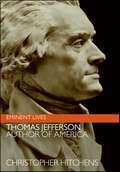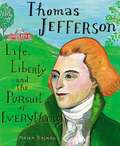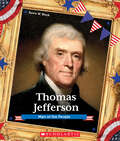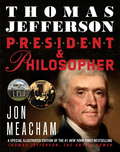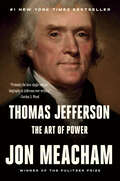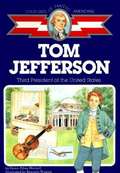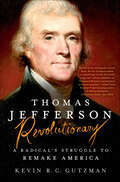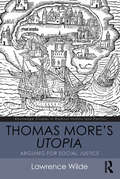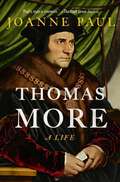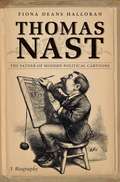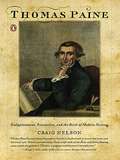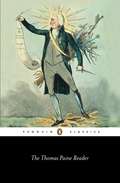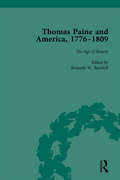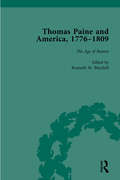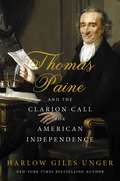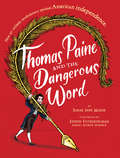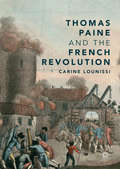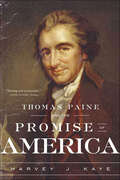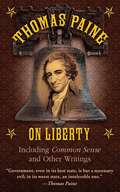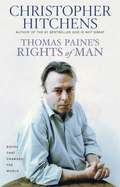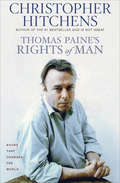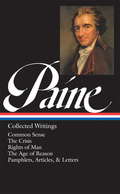- Table View
- List View
Thomas Jefferson: An Intimate History
by Fawn M. BrodieA bibliography of one of our most interesting Presidents, Thomas Jefferson.
Thomas Jefferson: Author of America (Eminent Lives)
by Christopher Hitchens"A balanced, readable portrait. A refreshing perspective.” —New York Times Book ReviewWith intelligence, insight, eloquence, and wit, bestselling author Christopher Hitchens gives us an artful portrait of a complex, formative figure in American history and his turbulent era.In this unique biography of Thomas Jefferson, leading journalist and social critic Christopher Hitchens offers a startlingly new and provocative interpretation of our Founding Father—a man conflicted by power who wrote the Declaration of Independence and acted as ambassador to France yet yearned for a quieter career in the Virginia legislature. A masterly writer, Jefferson was an awkward public speaker. A professed proponent of emancipation, he elided the issue of slavery from the Declaration of Independence and continued to own human property. A reluctant candidate, he left an indelible presidential legacy.
Thomas Jefferson: Life, Liberty and the Pursuit of Everything
by Maira KalmanRenowned artist Maira Kalman sheds light on the fascinating life and interests of the Renaissance man who was our third president.Thomas Jefferson is perhaps best known for writing the Declaration of Independence—but there’s so much more to discover. This energetic man was interested in everything. He played violin, spoke seven languages and was a scientist, naturalist, botanist, mathematician and architect. He designed his magnificent home, Monticello, which is full of objects he collected from around the world. Our first foodie, he grew over fifteen kinds of peas and advocated a mostly vegetarian diet. And oh yes, as our third president, he doubled the size of the United States and sent Lewis and Clark to explore it. He also started the Library of Congress and said, “I cannot live without books.” But monumental figures can have monumental flaws, and Jefferson was no exception. Although he called slavery an “abomination,” he owned about 150 slaves.As she did in Looking at Lincoln, Maira Kalman shares a president’s remarkable, complicated life with young readers, making history come alive with her captivating text and stunning illustrations.
Thomas Jefferson: Man of the People (Presidential Biographies)
by Sonia BlackMeet Thomas Jefferson, our third president-and one of the most famous of America's Founding Fathers. Jefferson was the author of the Declaration of Independence. During his time in office, he tried to maintain the ideals he had outlined in that document. He supported scientific exploration and worked to give Americans religious freedom and access to education. He will always be remembered.This series of engaging, in-depth books introduces readers to the men who have led our country since its very first days. Lively text and colorful illustrations are supplemented by fun facts, a timeline, and even a sampling of the subject's most famous quotes.Presidential Biographies will be the first books kids reach for when writing a report-or if they're simply looking for a fascinating read!
Thomas Jefferson: President and Philosopher
by Jon MeachamIn this special illustrated edition of the #1 New York Times bestselling Thomas Jefferson: The Art of Power by Pulitzer Prize-winning author Jon Meacham, young readers will learn about the life and political philosophy of one of our Founding Fathers. Thomas Jefferson was the third president of the United States. He was one of the authors of the Declaration of Independence. But he was also a lawyer and an ambassador, an inventor and a scientist. He had a wide range of interests and hobbies, but his consuming interest was the survival and success of the United States. This book contains a note from Meacham and over 100 archival illustrations, as well as sections throughout the text about subjects such as the Boston Tea Party, the Library of Congress, and Napoléon Bonaparte. Additional materials include a time line; a family tree; a Who's Who in Jefferson's world; sections on Jefferson's original writings and correspondence, "inventions," interests, places in Jefferson's world, finding Jefferson in the United States today, additional reading, organizations, and websites; notes; a bibliography; and an index. This adaptation, ideal for those interested in American presidents, biographies, and the founding of the American republic, is an excellent example of informational writing and reflects Meacham's extensive research using primary source material.
Thomas Jefferson: The Art of Power
by Jon MeachamNAMED ONE OF THE BEST BOOKS OF THE YEAR BY The New York Times Book Review * The Washington Post * Entertainment Weekly * The Seattle Times * St. Louis Post-Dispatch * Bloomberg BusinessweekIn this magnificent biography, the Pulitzer Prize-winning author of American Lion and Franklin and Winston brings vividly to life an extraordinary man and his remarkable times. Thomas Jefferson: The Art of Power gives us Jefferson the politician and president, a great and complex human being forever engaged in the wars of his era. Philosophers think; politicians maneuver. Jefferson's genius was that he was both and could do both, often simultaneously. Such is the art of power. Thomas Jefferson hated confrontation, and yet his understanding of power and of human nature enabled him to move men and to marshal ideas, to learn from his mistakes, and to prevail. Passionate about many things--women, his family, books, science, architecture, gardens, friends, Monticello, and Paris--Jefferson loved America most, and he strove over and over again, despite fierce opposition, to realize his vision: the creation, survival, and success of popular government in America. Jon Meacham lets us see Jefferson's world as Jefferson himself saw it, and to appreciate how Jefferson found the means to endure and win in the face of rife partisan division, economic uncertainty, and external threat. Drawing on archives in the United States, England, and France, as well as unpublished Jefferson presidential papers, Meacham presents Jefferson as the most successful political leader of the early republic, and perhaps in all of American history. The father of the ideal of individual liberty, of the Louisiana Purchase, of the Lewis and Clark expedition, and of the settling of the West, Jefferson recognized that the genius of humanity--and the genius of the new nation--lay in the possibility of progress, of discovering the undiscovered and seeking the unknown. From the writing of the Declaration of Independence to elegant dinners in Paris and in the President's House; from political maneuverings in the boardinghouses and legislative halls of Philadelphia and New York to the infant capital on the Potomac; from his complicated life at Monticello, his breathtaking house and plantation in Virginia, to the creation of the University of Virginia, Jefferson was central to the age. Here too is the personal Jefferson, a man of appetite, sensuality, and passion. The Jefferson story resonates today not least because he led his nation through ferocious partisanship and cultural warfare amid economic change and external threats, and also because he embodies an eternal drama, the struggle of the leadership of a nation to achieve greatness in a difficult and confounding world.Praise for Thomas Jefferson: The Art of Power "This is probably the best single-volume biography of Jefferson ever written."--Gordon S. Wood "A big, grand, absorbing exploration of not just Jefferson and his role in history but also Jefferson the man, humanized as never before."--Entertainment Weekly"[Meacham] captures who Jefferson was, not just as a statesman but as a man. . . . By the end of the book . . . the reader is likely to feel as if he is losing a dear friend. . . . [An] absorbing tale."--The Christian Science Monitor"This terrific book allows us to see the political genius of Thomas Jefferson better than we have ever seen it before. In these endlessly fascinating pages, Jefferson emerges with such vitality that it seems as if he might still be alive today."--Doris Kearns GoodwinFrom the Hardcover edition.
Thomas Jefferson: Third President of the United States
by Helen Albee MonsellUsing simple language that beginning readers can understand, this lively, inspiring, and believable biography looks at the childhood of America's third president, Thomas Jefferson.
Thomas Jefferson—Revolutionary: A Radical's Struggle to Remake America
by Kevin R. Gutzman"In this lively and clearly written book, Kevin Gutzman makes a compelling case for the broad range and radical ambitions of Thomas Jefferson's commitment to human equality." - Alan Taylor, Pulitzer Prize winning author of American Revolutions: A Continental History, 1750-1804Though remembered chiefly as author of the Declaration of Independence and the president under whom the Louisiana Purchase was effected, Thomas Jefferson was a true revolutionary in the way he thought about the size and reach of government, which Americans who were full citizens and the role of education in the new country. In his new book, Kevin Gutzman gives readers a new view of Jefferson—a revolutionary who effected radical change in a growing country.Jefferson’s philosophy about the size and power of the federal system almost completely undergirded the Jeffersonian Republican Party. His forceful advocacy of religious freedom was not far behind, as were attempts to incorporate Native Americans into American society. His establishment of the University of Virginia might be one of the most important markers of the man’s abilities and character.He was not without flaws. While he argued for the assimilation of Native Americans into society, he did not assume the same for Africans being held in slavery while—at the same time—insisting that slavery should cease to exist. Many still accuse Jefferson of hypocrisy on the ground that he both held that “all men are created equal” and held men as slaves. Jefferson’s true character, though, is more complex than that as Kevin Gutzman shows in his new book about Jefferson, a revolutionary whose accomplishments went far beyond the drafting of the Declaration of Independence.
Thomas K. Beecher: Minister to a Changing America
by Myra C. GlennOne of a series entitled Contributions to the Study of Religion
Thomas More's Utopia: Arguing for Social Justice (Routledge Studies in Radical History and Politics)
by Lawrence WildeThe 500th anniversary of the first publication of Thomas More’s Utopia invites a reappraisal of its significance, not just as an ironic and playful fiction, but as a serious contribution to social and political thought. More delivers a searing critique of the injustices of his time and imagines a radical alternative based on common ownership and representative government. In this new interpretation, Wilde surveys the context from which Utopia emerged and analyses its key themes – politics, economics, social relations, crime and punishment, war and religion. Although the society of the Utopians is created as a remedy to the ailments of the old world, there are restrictions on individual freedom which reflect More’s suspicion of human nature’s innate fragility. Wilde argues that this should not detract from the power of the book in challenging the root causes of inequality and oppression. The true legacy of Utopia lies in its plea for social justice in the face of a world driven by greed and the lust for power. A compelling case is made for the continued relevance of this masterpiece, a legacy that should not be diminished by attempts to discredit More’s character, which are dealt with here in the epilogue. Offering a new perspective on this important historical text, this book is essential reading for students and scholars working in radical politics, the history of social thought and literature, as well as anyone interested in learning more about this fascinating work.
Thomas More: A Life
by Joanne PaulThe definitive biography of the man who dominated political and intellectual circles in England during the sixteenth century: Thomas More.Born into the era of the Wars of the Roses, educated during the European Renaissance, rising to become Chancellor of England, and ultimately destroyed by Henry VIII, Thomas More was one of the most famous—and notorious—figures in English history. Was he a saintly scholar, the visionary author of Utopia, and an inspiration for statesmen and intellectuals even today? Or was he the cruel zealot famously portrayed in Hilary Mantel's Wolf Hall? Thomas More: A Life is a monumental biography of this hypnotic, flawed figure. Overturning prior interpretations of this titan of the sixteenth century, Joanne Paul shows Thomas More to have been intellectually and politically central to the making of modern Europe. Based on new archival discoveries and drawing on more than a decade of research into More&’s life and work, this is a richly told story of faith and politics that illuminates a man who, more than four hundred years after his execution, remains one of the most brilliant minds of the Renaissance.
Thomas Nast
by Fiona Deans HalloranThomas Nast (1840-1902), the founding father of American political cartooning, is perhaps best known for his cartoons portraying political parties as the Democratic donkey and the Republican elephant. Nast's legacy also includes a trove of other political cartoons, his successful attack on the machine politics of Tammany Hall in 1871, and his wildly popular illustrations of Santa Claus for Harper's Weekly magazine. Throughout his career, his drawings provided a pointed critique that forced readers to confront the contradictions around them. In this thoroughgoing and lively biography, Fiona Deans Halloran focuses not just on Nast's political cartoons for Harper's but also on his place within the complexities of Gilded Age politics and highlights the many contradictions in his own life: he was an immigrant who attacked immigrant communities, a supporter of civil rights who portrayed black men as foolish children in need of guidance, and an enemy of corruption and hypocrisy who idolized Ulysses S. Grant. He was a man with powerful friends, including Mark Twain, and powerful enemies, including William M. "Boss" Tweed. Halloran interprets Nast's work, explores his motivations and ideals, and illuminates Nast's lasting legacy on American political culture.
Thomas Paine
by Craig NelsonA fresh new look at the Enlightenment intellectual who became the most controversial of America's founding fathers Despite his being a founder of both the United States and the French Republic, the creator of the phrase "United States of America," and the author of Common Sense, Thomas Paine is the least well known of America's founding fathers. This edifying biography by Craig Nelson traces Paine's path from his years as a London mechanic, through his emergence as the voice of revolutionary fervor on two continents, to his final days in the throes of dementia. By acquainting us as never before with this complex and combative genius, Nelson rescues a giant from obscurity-and gives us a fascinating work of history.
Thomas Paine Reader
by Thomas PaineThis major collection demonstrates the extent to which Thomas Paine (1737-1809) was an inspiration to the Americans in their struggle for independence, a passionate supporter of the French Revolution and perhaps the outstanding English radical writer of his age. It contains all of Paine's major works including The Rights of Man, his groundbreaking defence of the revolutionary cause in France, Common Sense, which won thousands over to the side of the American rebels, and the first part of The Age of Reason (Part One), a ferocious attack on Christianity. The shorter pieces - on capital punishment, social reform and the abolition of slavery - also confirm the great versatility and power of this master of democratic prose.
Thomas Paine and America, 1776-1809 Vol 3: The Age Of Reason
by Kenneth W BurchellFrom his migration to America in 1774 to his death in New York City in 1809, Thomas Paine's ideology was at the centre of American political and social debate. This six-volume facsimile edition brings together rare texts from books, periodicals and newspaper contributions to unearth the contemporary American response to Thomas Paine.
Thomas Paine and America, 1776-1809 Vol 4: The Age Of Reason
by Kenneth W BurchellFrom his migration to America in 1774 to his death in New York City in 1809, Thomas Paine's ideology was at the centre of American political and social debate. This six-volume facsimile edition brings together rare texts from books, periodicals and newspaper contributions to unearth the contemporary American response to Thomas Paine.
Thomas Paine and the Clarion Call for American Independence
by Harlow Giles UngerFrom New York Times bestselling author and Founding Fathers' biographer Harlow Giles Unger comes the astonishing biography of the man whose pen set America ablaze, inspiring its revolution, and whose ideas about reason and religion continue to try men's souls. Thomas Paine's words were like no others in history: they leaped off the page, inspiring readers to change their lives, their governments, their kings, and even their gods. In an age when spoken and written words were the only forms of communication, Paine's aroused men to action like no one else. The most widely read political writer of his generation, he proved to be more than a century ahead of his time, conceiving and demanding unheard-of social reforms that are now integral elements of modern republican societies. Among them were government subsidies for the poor, universal housing and education, pre- and post-natal care for women, and universal social security. An Englishman who emigrated to the American colonies, he formed close friendships with Benjamin Franklin, Thomas Jefferson, and James Madison, and his ideas helped shape the Declaration of Independence and the Bill of Rights. However, the world turned against Paine in his later years. While his earlier works, Common Sense and Rights of Man, attacked the political and social status quo here on earth, The Age of Reason attacked the status quo of the hereafter. Former friends shunned him, and the man America had hailed as the muse of the American Revolution died alone and forgotten. Packed with action and intrigue, soldiers and spies, politics and perfidy, Unger's Thomas Paine is a much-needed new look at a defining figure.
Thomas Paine and the Dangerous Word (Hyperion Picture Book (eBook))
by Sarah Jane Marsh"The mind once enlightened cannot again become dark."As an English corset-maker's son, Thomas Paine was expected to spend his life sewing women's underwear. But as a teenager, Thomas dared to change his destiny, enduring years of struggle until a meeting with Benjamin Franklin brought Thomas to America in 1774-and into the American Revolution. Within fourteen months, Thomas would unleash the persuasive power of the written word in Common Sense-a brash wake-up call that rallied the American people to declare independence against the mightiest empire in the world. This fascinating and extensively researched biography, based on numerous primary sources, will immerse readers in Thomas Paine's inspiring journey of courage, failure, and resilience that led a penniless immigrant to change the world with his words.
Thomas Paine and the French Revolution
by Carine LounissiThis book explores Thomas Paine's French decade, from the publication of the first part of Rights of Man in the spring of 1791 to his return trip to the United States in the fall of 1802. It examines Paine's multifarious activities during this period as a thinker, writer, member of the French Convention, lobbyist, adviser to French governments, officious diplomat and propagandist. Using previously neglected sources and archival material, Carine Lounissi demonstrates both how his republicanism was challenged, bolstered and altered by this French experience, and how his positions at key moments of the history of the French experiment forced major participants in the Revolution to defend or question the kind of regime or of republic they wished to set up. As a member of the Lafayette circle when writing the manuscript of Rights of Man, of the Girondin constellation in the Convention, one of the few democrats who defended universal suffrage after Thermidor, and as a member of the Constitutional Circle which promoted a kind of republic which did not match his ideas, Paine baffled his contemporaries and still puzzles the present-day scholar. This book intends to offer a new perspective on Paine, and on how this major agent of revolutions contributed to the debate on the French Revolution both in France and outside France.
Thomas Paine and the Idea of Human Rights
by Robert LambThomas Paine is a legendary Anglo-American political icon: a passionate, plain-speaking, relentlessly controversial, revolutionary campaigner, whose writings captured the zeitgeist of the two most significant political events of the eighteenth century, the American and French Revolutions. Though widely acknowledged by historians as one of the most important and influential pamphleteers, rhetoricians, polemicists and political actors of his age, the philosophical content of his writing has nevertheless been almost entirely ignored. This book takes Paine's political philosophy seriously. It explores his views concerning a number of perennial issues in modern political thought including the grounds for, and limits to, political obligation; the nature of representative democracy; the justification for private property ownership; international relations; and the relationship between secular liberalism and religion. It shows that Paine offers a historically and philosophically distinct account of liberalism and a theory of human rights that is a progenitor of our own.
Thomas Paine and the Promise of America: A History & Biography
by Harvey J. KayeThis acclaimed biography “provides the most comprehensive assessment yet of [the Founding Father’s] controversial reputation” (Joseph J. Ellis, The New York Times Book Review).After leaving London for Philadelphia in 1774, Thomas Paine became one of the most influential political writers of the modern world and the greatest radical of a radical age. Through writings like Common Sense, he not only turned America’s colonial rebellion into a revolutionary war but, as Harvey J. Kaye demonstrates, articulated an American identity charged with exceptional purpose and promise.Thomas Paine and the Promise of America fiercely traces the revolutionary spirit that runs through American history—and demonstrates how that spirit is rooted in Paine’s legacy. With passion and wit, Kaye shows how Paine turned Americans into radicals—and how we have remained radicals ever since.
Thomas Paine on Liberty: Including Common Sense and Other Writings
by Thomas PaineThomas Paine is most famous for writing Common Sense, a pamphlet distributed during the American Revolution advocating for colonial America's independence from Great Britain. Now, collected here in a beautiful gift book volume are excerpts from this important historical American document, as well as several of his other writings.Paine believed in more than just freedom in the form of revolution and overthrowing governments. He also believed in freedom from oppressive and organized religions and monopolies. Included in this book are passages taken from The Age of Reason and The Rights of Man, as well as letters to George Washington, Benjamin Rush, and Samuel Adams, and pamphlets such as "The American Crisis" and "Agrarian Justice." Throughout his writings, Paine provides excellent and timeless wisdom on attaining liberty and living a democratic life.
Thomas Paine's Rights of Man: A Biography
by Christopher HitchensThomas Paine's "Rights of Man" has been celebrated, criticized, maligned, suppressed, and co-opted, but Hitchens marvels at its forethought and revels in its contentiousness. In this book, he demonstrates how Paine's book forms the philosophical cornerstone of the U.S.
Thomas Paine's Rights of Man: A Biography (Books That Changed the World #6)
by Christopher HitchensChristopher Hitchens, the #1 New York Times bestselling author of God Is Not Great has been called a Tom Paine for our times, and in this addition to the Books that Changed the World Series, he vividly introduces Paine and his Declaration of the Rights of Man, the world’s foremost defense of democracy. Inspired by his outrage at Edmund Burke’s attack on the French Revolution, Paine’s text is a passionate defense of man’s inalienable rights, and the key to his reputation. Ever since the day of publication in 1791, Declaration of the Rights of Man has been celebrated, criticized, maligned, suppressed, and co-opted, but in Thomas Paine’s Rights of Man, Hitchens marvels at its forethought and revels in its contentiousness. Famous as a polemicist and provocative commentator, Hitchens is a political descendent of the great pamphleteer. In this engaging work he demonstrates how Thomas Paine’s book forms the philosophical cornerstone of the United States of America, and how "in a time when both rights and reason are under attack, the life and writing of Thomas Paine will always be part of the arsenal on which we shall need to depend.”
Thomas Paine: Common Sense / The American Crisis / Rights of
by Thomas PaineThomas Paine was the impassioned democratic voice of the Age of Revolution, and this volume brings together his best-known works: Common Sense, The American Crisis, Rights of Man, The Age of Reason, along with a selection of letters, articles and pamphlets that emphasizes Paine's American years. "I know not whether any man in the world," wrote John Adams in 1805, "has had more influence on its inhabitants or affairs for the last thirty years than Tom Paine." The impassioned democratic voice of the Age of Revolution, Paine wrote for his mass audience with vigor, clarity, and "common sense." This Library of America volume is the first major new edition of his work in 50 years, and the most comprehensive single-volume collection of his writings available. Paine came to America in 1774 at age 37 after a life of obscurity and failure in England. Within fourteen months he published Common Sense, the most influential pamphlet for the American Revolution, and began a career that would see him prosecuted in England, imprisoned and nearly executed in France, and hailed and reviled in the American nation he helped create. In Common Sense, Paine set forth an inspiring vision of an independent America as an asylum for freedom and an example of popular self-government in a world oppressed by despotism and hereditary privilege. The American Crisis, begun during "the times that try men's souls" in 1776, is a masterpiece of popular pamphleteering in which Paine vividly reports current developments, taunts and ridicules British adversaries, and enjoins his readers to remember the immense stakes of their struggle. Among the many other items included in the volume are the combative "Forester" letters, written in a reply to a Tory critic of Common Sense, and several pieces concerning the French Revolution, including an incisive argument against executing Louis XVI. Rights of Man (1791-1792), written in response to Edmund Burke's attacks on the French Revolution, is a bold vision of an egalitarian society founded on natural rights and unbound by tradition. Paine's detailed proposal for government assistance to the poor inspired generations of subsequent radicals and reformers. The Age of Reason (1794-1795), Paine's most controversial work, is an unrestrained assault on the authority of the Bible and a fervent defense of the benevolent God of deism. Included in this volume are a detailed chronology of Paine's life, informative notes, an essay on the complex printing history of Paine's work, and an index.

